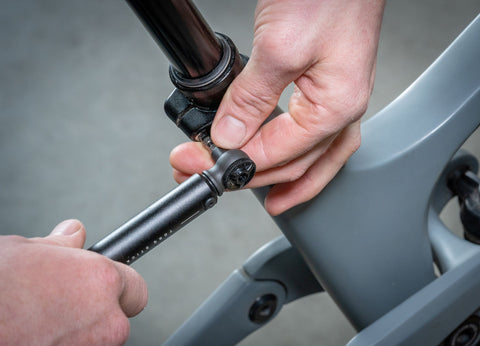DROPPER POST V2 CLEAN & GREASE SERVICE
Tools needed
- Waterproof grease (ie. Slickoleum, Slick Honey)
- Rubbing alcohol
- 2 & 5mm hex
- Pick tool
- Needle nose pliers
- Strap wrench
- 14 mm or 17mm wrench (or adjustable wrench)
- Lint-free Cloth

COMPLETE EXPLODED VIEW & PARTS LIST

This service should be completed every 50-100hrs of riding depending on the conditions in which you ride. Always check your air pressure after servicing. The pressure should be 250-300psi with the post fully extended.
Users are encouraged to perform regular maintenance earlier if required. If something seems rough or unusual after servicing please stop and contact info@oneupcomponents.com to avoid additional damage to the post.
STEP 1: SEAT CLAMP ASSEMBLY
Unthread rear clamp bolt (4) using your 5mm hex key. Remove clamp nut (1) & upper clamp (2). You can then remove your saddle & the lower clamp (3). Clean assembly and put aside until you have check the air pressure at the end of this service.
TIP: Leave front clamp bolt (4) & dont adjust it. When you reinstall the seat, torque the rear clamp bolt to 8Nm (70 in-lbs) and your seat angle will remain correct.

STEP 2: MID CAP ASSEMBLY
Compress the dropper post into a mid travel position. Unscrew the mid cap assembly (8) by hand or using a strap wrench and slide it up towards the seatpost head.


STEP 3: REMOVE ACTUATOR FROM LOWER TUBE
Unscrew the bottom green actuator (16) from the lower tube (12) using your wrench.
- For V2.1 actuators use a 14mm wrench.
- For V2.0 actuators use a 17mm wrench.

Once free of the lower tube (12), you can slide the lower tube up the upper tube (7) to expose the cartridge (14) & actuator lock bolts (17)

STEP 4: REMOVE ACTUATOR FROM CARTRIDGE
Remove the 2 actuator lock bolts (17) using your 2mm hex key. You can then slide the actuator (16) & bumper (15) off the bottom of the cartridge (14).


Note: The cartridge push rod is held into the cartridge (14) by the actuator (16). When the actuator is off, the push rod can fall out of the cartridge (14). You can either make sure the push rod stays within the cartridge (14) during removal or you can remove it, wipe it clean and set it aside until re-installation.

STEP 5: REMOVE LOWER TUBE FROM UPPER TUBE
Slowly slide the lower tube (12) down off of the upper tube (7).

STEP 6: CLEANING & INSPECTION
Remove old grease from the upper tube (7) and from inside the lower tube (12). Clean the upper tube with rubbing alcohol. When cleaning the lower tube be careful not to knock the guide pins (10) out of their seats.

It is recommended at this time to assess the guide pins (10) & bushings (9,11) for excess grit or damage.
If the internals look to be in rough shape it is recommended you get ahold of a V2 REBUILD KIT & proceed with a full rebuild: V2 DROPPER POST REBUILD INSTRUCTIONS
If the internals look clean & undamaged then proceed with greasing.
STEP 7: APPLY GREASE
Using your finger, apply grease to the area around the guide pins (10), the bushings (9,11) on the upper tube (7) and inside the top of the lower tube (12).
You can, to be thorough, remove the bushings by hand and grease the inside of them as well.

STEP 8: LOWER TUBE INSTALLATION & ALIGNMENT
Align the guide pins (10) with machined grooves in the lower tube (12). For aesthetic purposes, the Lasered logoing on the lower tube should be centered at the rear of the post. For reference, the two guide pin slots should line up with the outer edges of the ONE lasered logo, as pictured below.

Push lower tube up until the cartridge is exposed at the bottom of the post.
STEP 9: INSTALL ACTUATOR TO CARTRIDGE
Slide the bumper (15) onto the cartridge (14) shaft. If you removed the pushrod, now is the time to insert it back into the cartridge.

Slide the actuator (16) over the end of the cartridge (14). Install the lock bolts (17) making sure they slide through the grooves of the cartridge. Tighten the lock bolts using a 2mm hex hand tight.

STEP 10: SECURE ACTUATOR TO LOWER TUBE
Thread the actuator (16) into the lower tube (12). Start slow by hand to avoid cross-threading. Once hand tight, use the wrench to snug the actuator to lower tube.

STEP 11: MID CAP ASSEMBLY
Making sure the post is compressed at least 50mm (2"), seat the upper bushing (9) into the top of the lower tube (12). Thread the mid cap assembly (8) into the lower tube and tighten by hand or with strap wrench.

STEP 12: PRESSURE CHECK & INFLATION
Manually actuate post to max extension. Remove valve cap (5) by hand or with needle nose pliers. Attach Shock pump to valve. Inflate post to 250-300psi in the fully extended position.
Note: Because these cartridges are high pressure in a small volume, the equalization of the pump upon installation will produce a lower pressure reading than what was originally in the cartridge. This pressure loss can be as much as 50psi depending on the pump size and quality.

Remove shock pump and reinstall the valve cap (5) on the valve stem
.
STEP 13: SEAT CLAMP ASSEMBLY
Place lower clamp (3) into the cradle of the upper tube (7). Make sure the arrow is pointing forward. Place your saddle on the lower clamp. Holding your saddle, slide the upper clamp (2), arrow forward, under the front clamp nut (1) and place it on top of the saddle rails. You can then drop the rear clamp nut into its seat at the back of the upper clamp. Thread rear clamp bolt (4) into nut and tighten to 8Nm.
STEP 14: INSTALL POST ON BIKE
Clean out old FibreGrip or grease from the seat tube. Apply a fresh layer of fibregrip or grease to seat tube. Attached cable with barrel end to the dropper actuator. Carefully slide post back into seat tube while slowly pulling the remote side of the housing from the frame to aviod kinking the internally routed cable & housing. Set post to your proper ride height & torque seat post collar no more than 4Nm.


Congratulations, you have now successfully completed the V2 Dropper Clean & Grease service.
NOW GO RIDE!
If you are having any problems please first double check that you have correctly completed each of the above steps.
If you are still having trouble please email us at support@oneupcomponents.com for help. Please include a detailed description of your issue. Photos are often helpful.
Thanks,
OneUp
